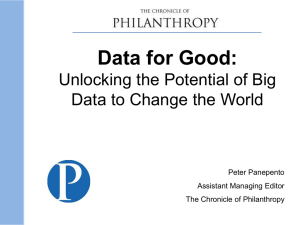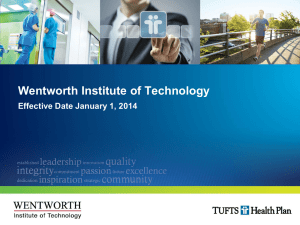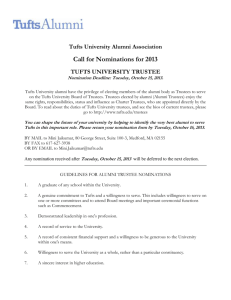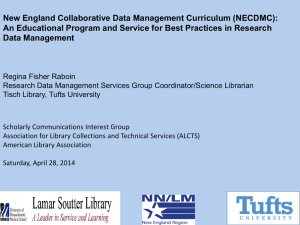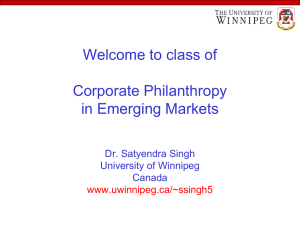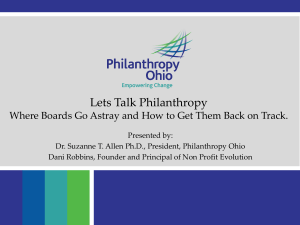BOOK INVENTORY - Jonathan M. Tisch College of Citizenship and
advertisement
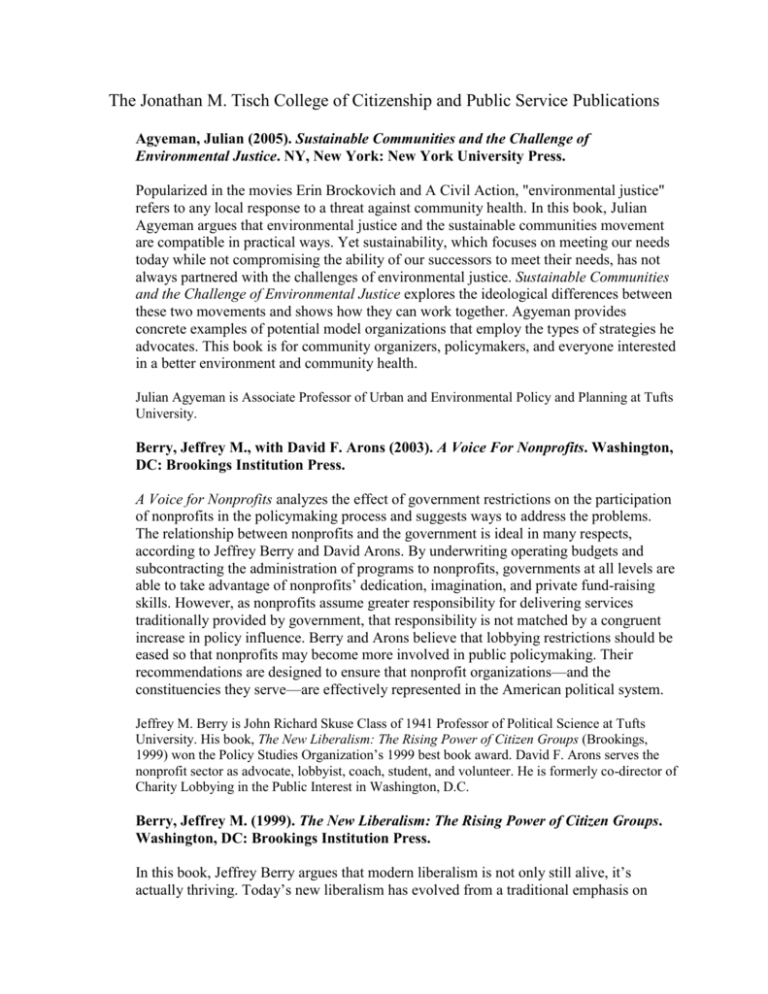
The Jonathan M. Tisch College of Citizenship and Public Service Publications Agyeman, Julian (2005). Sustainable Communities and the Challenge of Environmental Justice. NY, New York: New York University Press. Popularized in the movies Erin Brockovich and A Civil Action, "environmental justice" refers to any local response to a threat against community health. In this book, Julian Agyeman argues that environmental justice and the sustainable communities movement are compatible in practical ways. Yet sustainability, which focuses on meeting our needs today while not compromising the ability of our successors to meet their needs, has not always partnered with the challenges of environmental justice. Sustainable Communities and the Challenge of Environmental Justice explores the ideological differences between these two movements and shows how they can work together. Agyeman provides concrete examples of potential model organizations that employ the types of strategies he advocates. This book is for community organizers, policymakers, and everyone interested in a better environment and community health. Julian Agyeman is Associate Professor of Urban and Environmental Policy and Planning at Tufts University. Berry, Jeffrey M., with David F. Arons (2003). A Voice For Nonprofits. Washington, DC: Brookings Institution Press. A Voice for Nonprofits analyzes the effect of government restrictions on the participation of nonprofits in the policymaking process and suggests ways to address the problems. The relationship between nonprofits and the government is ideal in many respects, according to Jeffrey Berry and David Arons. By underwriting operating budgets and subcontracting the administration of programs to nonprofits, governments at all levels are able to take advantage of nonprofits’ dedication, imagination, and private fund-raising skills. However, as nonprofits assume greater responsibility for delivering services traditionally provided by government, that responsibility is not matched by a congruent increase in policy influence. Berry and Arons believe that lobbying restrictions should be eased so that nonprofits may become more involved in public policymaking. Their recommendations are designed to ensure that nonprofit organizations—and the constituencies they serve—are effectively represented in the American political system. Jeffrey M. Berry is John Richard Skuse Class of 1941 Professor of Political Science at Tufts University. His book, The New Liberalism: The Rising Power of Citizen Groups (Brookings, 1999) won the Policy Studies Organization’s 1999 best book award. David F. Arons serves the nonprofit sector as advocate, lobbyist, coach, student, and volunteer. He is formerly co-director of Charity Lobbying in the Public Interest in Washington, D.C. Berry, Jeffrey M. (1999). The New Liberalism: The Rising Power of Citizen Groups. Washington, DC: Brookings Institution Press. In this book, Jeffrey Berry argues that modern liberalism is not only still alive, it’s actually thriving. Today’s new liberalism has evolved from a traditional emphasis on bread-and-butter economic issues to a form he calls “postmaterialism” – quality-of-life concerns such as enhancing the environment, protecting consumers, or promoting civil rights. By analyzing the activities of Congress during three sessions (1963, 1979, and 1991), Berry demonstrates the correlation between the increasing lobbying activities of citizen groups and a dramatic shift in the American political agenda from an early 1960s emphasis on economic equality to today’s postmaterialist issues. Although conservative groups also began to emphasize postmaterial concerns – such as abortion and other family value issues – Berry finds that liberal citizen groups have been considerably more effective than conservative ones at getting their goals onto the congressional agenda and enacted into legislation. The book provides many examples of citizen group issues that Congress enacted into law, successes when citizen groups were in direct conflict with business interests and when demands were made on behalf of traditionally marginalized constituencies, such as the women’s and civil rights movements. Berry concludes that although liberal citizen groups make up only a small portion of the thousands of lobbying organizations in Washington, they have been, and will continue to be, a major force in shaping the political landscape. Jeffrey M. Berry is John Richard Skuse Class of 1941 Professor of Political Science at Tufts University. The New Liberalism: The Rising Power of Citizen Groups (Brookings, 1999) won the Policy Studies Organization’s 1999 best book award. Brugge, Doug & H. Patricia Hynes, eds. (2005). Community Research in Environmental Health: Studies in Science, Advocacy, and Ethics. Aldershot, Hants, Eng.; Burlington, VT: Ashgate. In this book, Doug Brugge and H. Patricia Hynes relate experiences of multiple community collaborations across the United States and highlight the lessons to be learned for those involved in or embarking on community-collaborative research. The volume brings together a variety of cases, examining the nature and form that the collaboration took, the scientific findings from the work and the ethical issues that needed to be addressed. Actual cases covered include lead contaminated soil, asthma and housing conditions, the impact of development on environmental health, the impact of radiation hazards, urban gardening, hog farming and diesel exhaust. The concluding section analyzes the experiences of those involved and puts their findings into broader context. This book provides a valuable guide for all those interested and involved in community research. Doug Brugge is Associate Professor of Community Health at Tufts University School of Medicine, Boston. H. Patricia Hynes is Professor of Environmental Health at Boston University’s School of Public Health. Brugge, Doug, Timothy Benally & Esther Yazzie-Lewis, eds. (2006). The Navajo People and Uranium Mining. Albuquerque, NM: University of New Mexico Press. The Navajo Nation covers a vast stretch of northeastern Arizona and parts of New Mexico and Utah. The area is also home to more than one thousand abandoned uranium mines and four former uranium mills, a legacy of the U.S. nuclear program. A team of Navajo people and supportive whites began the Navajo Uranium Miner Oral History and Photography Project from which this book arose. That project team, based at Tufts University School of Medicine in Boston, recruited the speakers who told their stories, which are reproduced here. There are also narrative chapters that assess the experiences of the Navajo people from diverse perspectives (history, psychology, culture, advocacy, and policy). While the points of view taken are similar, there is a range of perspectives as to what would constitute justice. The Navajo People and Uranium Mining is the documented history of how these Navajo people lived, how they worked and now, sadly, how they died waiting for compassionate federal compensation for laboring in the most hazardous conditions imaginable, and which were known at the time yet concealed from them. These Navajo miners and their families became, in essence, expendable people. Based on statements given to the Navajo Uranium Miner Oral History and Photography Project, this book assesses the effects of uranium mining on the reservation beginning in the 1940s. Doug Brugge is Associate Professor of Community Health at Tufts University School of Medicine, Boston. Timothy Benally, a bilingual Navajo, is retired Director of both the Office of Navajo Uranium Workers and the Uranium Education Center, Diné College, Shiprock, New Mexico. Esther Yazzie-Lewis is a bilingual Navajo and recently completed her master's degree in American Studies at the University of New Mexico, Albuquerque. Capek, Mary Ellen & Molly Mead (2006). Effective Philanthropy: Organizational Success Through Deep Diversity and Gender Equality. Cambridge, MA: MIT Press. In Effective Philanthropy, Mary Ellen Capek and Molly Mead offer strategies for strengthening organizations through a commitment to diversity and gender equality. Their research shows that institutionalizing a more nuanced understanding of what they call "deep diversity" allows organizations to make full use of all the resources they have available, both inside and outside their doors. The authors show how foundations have used "differences that divide us" -- race, class, gender, sexual orientation, geography, age, religion, physical ability, and others -- to become learning organizations, a proven strategy for organizational effectiveness. By virtue of their "power of the purse" and more subtle forms of influence, foundations are key players in US social, economic, and public policy and are increasingly influential internationally. When foundations function effectively, there is potential for tremendous public benefit, and Capek and Mead argue that goals for equity in philanthropy are similar to goals for any effective organization. Offering demographics, case studies, strategic funding initiatives, theoretical analyses, and original research, Effective Philanthropy describes models for building effective foundations that can be applied to all kinds of institutions -- large and small, public and private, national and regional, bureaucratic and entrepreneurial -- including colleges and universities, nonprofits, government agencies, and multinational corporations. Mary Ellen S. Capek is a Principal in Capek & Associates, a philanthropic and nonprofit research and consulting group based in Corrales, New Mexico, and a Visiting Scholar at the Anderson Schools of Management at the University of New Mexico. Molly Mead is the former Lincoln Filene Professor at the Tisch College of Citizenship and Public Service at Tufts University, and is now Director of the Center for Community Engagement at Amherst College. Clift, Elayne (2005). Women, Philanthropy and Social Change: Visions for a Just Society. Hanover, NH: Tufts University Press of New England. In her quest to demystify and honor women's philanthropy, Clift turns to an impressive array of the movement's current leaders. As these remarkable women share their reflections and knowledge on the women's funding movement, it becomes clear that "women and philanthropy"--not so long ago a seeming oxymoron--harbors the marvelous potential for global social change across gender, race, and age barriers. In this insightful collection, Clift and the contributors make the case for the passion and potential of women's giving. Women, Philanthropy, and Social Change celebrates women's power to influence social constructs and political policies--ultimately changing the very foundations of society. Elayne Clift is an award-winning writer and journalist who has worked internationally on women’s health, communication, and development issues. Edwards, Bob, Michael W. Foley & Mario Diana, eds. (2001). Beyond Tocqueville: Civil Society and the Social Capital Debate in Comparative Perspective. Hanover, NH: University Press of New England. Beyond Tocqueville discusses the role of civil society in democratic governance around the world and how the decline of social capital in the US has raised pressing theoretical and empirical questions about the character of contemporary societies and the social and institutional correlates of sound and dynamic democracies. This debate has reached a North American and European audience that extends well beyond academia. The predominant refrain in the debate, following Alexis de Tocqueville’s 160-year-old analysis of democracy in America, attaches tremendous importance to the role of voluntary associations in contemporary democracies. Participation in such groups is said to produce social capital, often linked to high levels of social trust. Social capital in turn is conceived as a crucial national resource for promoting collective action for the common good. This book presents 21 varied essays on how civic engagement and political and economic cooperation are generated in contemporary societies, linking theoretical discourse with public policy and actual behaviors. Bob Edwards is Assistant Professor of Sociology at East Carolina University. Michael W. Foley is an Associate Professor of Politics at Catholic University of America. Mario Diani is Professor of Sociology at Strathclyde University in Glasgow. Edwards, Michael (2004). Civil Society. Malden, MA: Polity Press. Edwards gives voice to a rich and diverse account of civil society in its many different guises. In moving systematically through theories of associational life, the good society and the public sphere, exploring the neglected connections that exist between them, and clarifying their implications for policy and practice, Michael Edwards provides a comprehensive, accessible and often humorous overview of one of the most important debates of our times. Michael Edwards is Director of the Ford Foundation’s Governance and Civil Society Program. Eisenberg, Pablo (2005). Challenges for Nonprofits and Philanthropy: The Courage to Change: Three Decades of Reflections. Hanover, NH: University Press of New England. Eisenberg has provoked thoughtful, and at times contentious, debate in the nonprofit world. He has addressed the questions and challenges facing philanthropy today, and his forthright commentary has influenced contemporary philanthropy. The works collected here include the best of Eisenberg’s published and unpublished pieces on American and global philanthropy—its challenges, responsibilities, hits and misses, accountability, and leadership—and on his views of what lies ahead as the greatest intergenerational transfer of wealth in U.S. history looms. The book incorporates tributes to many of the leading lights in late-twentieth-century American philanthropy, including John Gardner, Paul Ylvisaker, John Filer, and David Hunter, men Eisenberg knew well. Every nonprofit leader, donor, grant maker, anyone involved with poverty-fighting organizations as well as faculty members and researchers who study nonprofit organizations will need this collection of writings by of one of the nation’s most prominent leaders in the nonprofit world. Pablo Eisenberg is a Senior Fellow at the Georgetown University Policy Institute. Glaser, James M. (2005). The Hand of the Past in Contemporary Southern Politics. New Haven: Yale University Press. In this book, a central story of contemporary southern politics is the emergence of Republican majorities in the region’s congressional delegation. Acknowledging the significance and scope of the political change, Glaser argues that, nevertheless, strands of continuity affect the practice of campaign politics in important ways. Strong southern tradition underlies the strategies pursued by the candidates, their presentational styles, and the psychology of their campaigns. The author offers eyewitness accounts of recent congressional campaigns in Texas, Mississippi, Virginia, North Carolina, and South Carolina. In the tradition of his award-winning book Race, Campaign Politics, and the Realignment in the South, Glaser captures the “stuff” of politics—the characters, the images, the rhetoric, and the scenery. Painting a full and fascinating picture of what it is like on the campaign trail, Glaser provides insights into the ways that the “hand of the past” reaches into the southern present. James M. Glaser is Professor of Political Science and Dean of Undergraduate Education for Arts, Sciences, and Engineering at Tufts University. Hodgkinson, Virginia & Michael W. Foley (2003). The Civil Society Reader. Hanover, NH: Tufts University Press of New England. Hodgkinson and Foley assemble a definitive collection of 24 readings from the writings of thinkers who have shaped the civil society tradition in Western political thought through the ages. Their clear, intelligent introduction establishes a framework for understanding the complex and perennial debate over conditions of citizenship and the character of the good society. The text moves from the origins of the debate, a consideration of Aristotle's vision of political order, the polis, through the "civic republicanism" of Machiavelli and his English and American followers. It also discusses Hobbes's and Montesquieu's conceptions of natural law and the social contract, Immanuel Kant and Adam Ferguson and the emergence of the modern notion of civil society in the late 18th century, and the thoughts and theories of Hegel, Marx, and Gramsci. As the concept of "civil society" grows ever more prominent in academic and public considerations of politics and political organization, citizen participation, political alienation, voluntary organizations, privatization, government deregulation, and "faithbased" charities, Civil Society: A Reader is the essential historical and theoretical text. Virginia Hodgkinson is Research Professor at Georgetown Public Policy Institute. Michael W. Foley is an Associate Professor of Politics at Catholic University of America. Jennings, James (2003). Welfare Reform and the Revitalization of Inner City Neighborhoods. East Lansing, MI: Michigan State University Press. Welfare Reform and the Revitalization of Inner City Neighborhoods examines the institutional impact of welfare reform on community-based organizations. Unlike many studies that treat children and individuals of families as the units for analyzing the effects of public policy, Jennings uses a case-study approach involving three low-income neighborhoods in Massachusetts, which assesses the effects of welfare reform based on the neighborhood. Jennings’s work reveals an inconsistency in the increasing call upon foundations and government for building social capital and civic participation as a response to problems faced by inner-city communities, as well as the institutional effects of welfare reform. James Jennings is Professor of Urban and Environmental Policy and Planning at Tufts University. He is the author of The Politics of Black Empowerment, which received the Gustavus Myers Award for Best Book on Human Rights in 1993. Kenny, Maureen E., Lou Anna K. Simon, Karen Kiley-Brabeck & Richard M. Lerner, eds. (2002). Learning to Serve: Promoting Civil Society Through Service Learning. Boston, MA: Kluwer Academic Publishers. Service learning, as defined by the editors, is the generation of knowledge that is of benefit to the community as a whole. This seventh volume in the Outreach Scholarship book series contributes a unique discussion of how service learning functions as a critical cornerstone of outreach scholarship. The sections and chapters of this book marshal evidence in support of the idea that undergraduate service learning, infused throughout the curriculum and coupled with outreach scholarship, is an integral means through which higher education can engage people and institutions of the communities of this nation in a manner that perpetuate civil society. The editors, through this series of models of service learning, make a powerful argument for the necessity of "engaged institutions". Maureen E. Kenny is Associate Professor in the Department of Counseling in Developmental and Educational Psychology at Boston College. Lou Anna K. Simon is President of Michigan State University. Karen Kiley-Brabeck was a master’s degree candidate at Fordham University, and Richard Lerner is the Bergstrom Chair in Applied Developmental Science and the Director of the Applied Developmental Science Institute in the Eliot-Pearson Department of Child Development at Tufts University. Lerner, Richard (2004). Liberty: Thriving and Civic Engagement Among America’s Youth. Thousand Oaks, CA: SAGE Publications. Liberty examines what it means to develop as an exemplary young person - that is, a young person who is thriving within the community and on the rise to a hopeful future. The book explores several key characteristics of positive youth development such as competence, character, confidence, social connections, and compassion that coalesce to create a young person who is developing successfully towards an "ideal" adulthood, one marked by contributions to self, others, and the institutions of civil society. In this unique work, author Richard M. Lerner brings his formidable knowledge of developmental systems theory and facts on youth development to analyze the meaning of a thriving civil society and its relationship to the potential of youth for self-actualization and positive development. This book argues that a young person’s ability to thrive is enabled by a society that supports the rights of individuals to develop their abilities as best they can and that a civil society supporting individual freedom and justice can only exist when the people in that society act to support, protect, and extend the societal institutions affording such liberty for all of its citizens. Richard Lerner is the Bergstrom Chair in Applied Developmental Science and the Director of the Applied Developmental Science Institute in the Eliot-Pearson Department of Child Development at Tufts University. Lerner, Richard M., Francine Jacobs & Donald Wertlieb, eds. (2003). Handbook of Applied Developmental Science: Promoting Positive Child, Adolescent, and Family Development Through Research, Policies, and Programs. Volumes 1-4. Thousand Oaks, CA: SAGE Publications. The Handbook of Applied Developmental Science is the only work to comprehensively present the latest theory, research, and application from applied developmental science (ADS) and the positive psychology movement. It summarizes and synthesizes the best scientific knowledge from ADS to help readers understand the efforts being made around the world to ensure that all children and adolescents develop into healthy adults who contribute positively to society. The first resource to organize and integrate both the prevention and promotion approaches to programs and policies, the Handbook provides a detailed road map for future research and for actions that will promote positive child, youth, and family development. Published in four topical volumes, Volume 1 describes the foundation of applied developmental science, its historical development, and current scientific and professional efforts to develop policies and programs that promote development. Volume 2 examines public policy and government service systems. Volume 3 discusses community systems for enhancing citizenship and promoting a civil society. Finally, Volume 4 outlines methods for university engagement and academic outreach. Donald Wertlieb, Ph.D., is Professor of Child Development at Tufts University. Francine Jacobs, Ed.D., is Associate Professor at Tufts University, with a joint appointment in the Eliot-Pearson Department of Child Development and the Department of Urban and Environmental Policy and Planning. Richard Lerner is the Bergstrom Chair in Applied Developmental Science and the Director of the Applied Developmental Science Institute in the Eliot-Pearson Department of Child Development at Tufts University. Lyson, Thomas A. (2004). Civic Agriculture: Reconnecting Farm, Food, and Community (Civic Society Series). Medford, MA: Tufts University Press. Thomas describes how, in the course of a hundred years, a small-scale, diversified system of farming became an industrialized system of production and also how this industrialized system has gone global. He argues that farming in the United States was modernized by employing the same techniques and strategies that transformed the manufacturing sector from a system of craft production to one of mass production. Viewing agriculture as just another industrial sector led to transformations in both the production and the processing of food. As small farmers and food processors were forced to expand, merge with larger operations, or go out of business, they became increasingly disconnected from the surrounding communities. Lyson enumerates the shortcomings of the current agriculture and food systems as they relate to social, economic, and environmental sustainability. He then introduces the concept of community problem solving and offers empirical evidence and concrete examples to show that a relocalization of the food production system is underway. Thomas A. Lyson is Professor of Rural Sociology at Cornell University and the author of Two Sides to the Sunbelt: The Growing Divergence Between the Rural and Urban South. Macedo, Stephen, ed. (2005). Democracy at Risk: How Political Choices Undermine Citizen Participation and What We Can Do About It. Washington, DC: Brookings Institution Press. In Democracy at Risk, a team of leading political scientists performs three essential tasks: *They document recent trends in civic engagement. *They show how these trends have been shaped by the design of political institutions and public policies. *They provide recommendations on how to improve the quality, amount, and distribution of civic engagement. Democracy at Risk focuses on three key factors influencing public participation: the electoral process, including political campaigns and subsequent elections; the American metropolis, including demographic changes and evolving development patterns; and the critical role of nonprofit organizations, voluntary associations, and the philanthropy that helps keep them growing. Undertaken with the support of the American Political Science Association, the book tests the proposition that scholarship can provide useful insights on the state of our democratic life. It charts a course for reinvigorating civic participation in the world’s most powerful democracy. The authors: Stephen Macedo (Princeton University), Yvette Alex-Assensoh (Indiana University), Jeffrey M. Berry (Tufts), Michael Brintnall (American Political Science Association), David E. Campbell (Notre Dame), Luis Ricardo Fraga (Stanford), Archon Fung (Harvard), William A. Galston (University of Maryland), Christopher F. Karpowitz (Princeton), Margaret Levi (University of Washington), Meira Levinson (Radcliffe Institute), Keena Lipsitz (California-Berkeley), Richard G. Niemi (University of Rochester), Robert D. Putnam (Harvard), Wendy M. Rahn (University of Minnesota), Rob Reich (Stanford), Robert R. Rodgers (Princeton), Todd Swanstrom (Saint Louis University), and Katherine Cramer Walsh (University of Wisconsin). Milner, Henry (2002). Civic Literacy: How Informed Citizens Make Democracy Work. Hanover, NH: University Press of New England. Milner argues that a society's level of civic literacy -- the knowledge and capacity of citizens to make sense of their political world -- offers a better basis for understanding the civil societies of disparate cultures, and comparing the effectiveness of their democratic institutions. Milner marshals a wealth of data from the US, Canada, Western Europe, Australia, and New Zealand to show how civic literacy underpins effective democracies. Masterfully weaving together philosophical debates over citizenship and community with the empirical findings of social scientists and his own first-hand experience of a variety of cultures, Milner shows that a population's degree of civic literacy is the single best predictor of its level of political participation. Drawing on the experience of the high civic literacy societies of Northern Europe, he sets out a series of policies -- policies linked to the role of the media, to adult and civic education, and to the informativeness of partisan political debate -- that lay the groundwork for the exercise of the responsibilities of citizenship in the 21st century. Henry Milner is a Political Scientist at the Universities of Laval in Canada and Umea, in Sweden, and a noted scholar of comparative politics. Najam, Adil (2007). Portrait of a Giving Community: Philanthropy by the PakistaniAmerican Diaspora. Cambridge, MA: Global Equity Initiative. Portrait of a Giving Community is based on a nationwide survey of the giving habits of Pakistani-Americans. This study, the first of its kind, not only examines the history, demography, and institutional geography of Pakistani-Americans but also looks at how this immigrant community manages its multiple identities through charitable giving and volunteering. It provides a snapshot in time of a generous and giving community whose philanthropy has become increasingly "American" without being less "Pakistani." Who are the Pakistani-Americans? What is the extent of their diaspora giving to Pakistan? What can be done to increase and channel their philanthropy for more equitable development in Pakistan? How much do they give within the U.S. and to causes unrelated to Pakistan? How does this community manage the hyphen in "Pakistani-American"? These are some of the questions that motivate this book. Adil Najam is Associate Professor at the Fletcher School of Law and Diplomacy, Tufts University, and an Associate of the International Institute for Sustainable Development (IISD). Najam, Adil, Mihaela Papa & Nadaa Talyab (2006). Global Environmental Governance: A Reform Agenda. Manitoba, Canada: Internacional Institute for Sustainable Development (IISD). Global Environmental Governance (GEG) is the sum of organizations, policy instruments, financing mechanisms, rules, procedures and norms that regulate the processes of global environmental protection. Since environmental issues entered the international agenda in the early 1970's, global environmental politics and policies have been developing rapidly. The environmental governance system we have today reflects both the successes and failures of this development. It has become increasingly clear that the GEG system, as we know it, has outgrown its original design and intent. The system's high maintenance needs, its internal redundancies and its inherent inefficiencies have combined to have the perverse effect if distracting from the most important GEG goal of all-improved environmental performance. The system needs reform not because it has "failed" but because it has outgrown its own original design. Much like children who outgrow their clothes as they mature, the GEG system needs to be rethought so that it can meet the challenges of its own growth, respond to future issues, and move from its current emphasis on awareness raising and treaty creation to actual environmental action and implementation. This book identifies a number of practical steps that can foster more efficient and effective global environmental governance, making better use of the resources available and designed in a way that will be more helpful to the implementation of international environmental agreements for developing as well as developed countries. Adil Najam is Associate Professor at the Fletcher School of Law and Diplomacy, Tufts University, and an Associate of the International Institute for Sustainable Development (IISD). Mihaela Papa and Nadaa Taiyab were both graduate researchers at the Center for International Environmental and Resource Policy (CIERP) at the Fletcher, Tufts University. O’Connell, Brian (2005). Fifty Years in Public Causes: Stories From a Road Less Traveled. Medford, MA: Tufts University Press. In his book, O'Connell traces a lifetime of encouraging citizen participation and influence beginning at the local level and extending to national and international crusades. O'Connell worked with the American Heart Association in its earliest efforts to reduce death and disability from heart attack and stroke, spent twelve years as national head of the Mental Health Association during major breakthroughs in the understanding and treatment of depression, and was on the ground floor of the founding of CIVICUS: World Alliance for Civic Participation. O'Connell imparts to readers the priceless lessons he gleaned during a lifetime of third-sector experience. His reflections celebrate voluntary action and provide practical advice on ensuring its growth and impact in the years ahead. Brian O’Connell is a founder of the Jonathan M. Tisch College of Citizenship and Public Service at Tufts University, a board member of Tisch College, and a Trustee Emeritus with Tufts University’s Board of Trustees. He is the author of fourteen books including People Power (1994) and The Underpinnings of American Democracy. Ostrander, Susan. (1995) Money for Change: Social Movement Philanthropy at Haymarket People's Fund. Temple University Press. Charitable foundations are being called upon to operate in more open and democratic ways and to involve a more diverse constituency. This study details the inner workings of a democratically organized philanthropy, where funding decisions are made by community activists. Ostrander spent two years doing intensive field research at the Haymarket People's Fund—a small, Boston-based foundation. Based on a philosophy of raising and giving away money called "Change Not Charity," the Fund makes grants to local grassroots social change organizations. The world of social movement funding comes alive with Ostrander's description of grantmaking, policy meetings, donor events, and the day-to-day work of the Fund staff. Within this behind-the-scenes account, Ostrander argues that the "social relations of philanthropy" are more important and more varied than previously understood. Written at a time when Haymarket was dealing with crisis, this book tells a story of organizational change as the Fund moved from an informal collective to a more formal structure; it is also the story of a struggle to build a multi-race, multi-class, gender-equal organization. Ostrander details these ongoing struggles and addresses the larger issue of how fundraising can itself be a kind of social movement organizing among the progressive people with wealth who continue to be Haymarket's main donors. Susan A. Ostrander is Professor of Sociology at Tufts University and author of Women of the Upper Class. Portney, Kent (2003) Taking Sustainable Cities Seriously: Economic Development, the Environment, and Quality of Life in American Cities. Cambridge, Massachusetts: MIT Press. Today at least twenty-five major U.S. cities have pursued some form of sustainability initiative. Although many case studies and "how-to" manuals have been published, there has been little systematic comparison of these cities' programs and initiatives. In this book Portney lays the theoretical groundwork for research on what works and what does not, and why. Distinguishing cities on the basis of population characteristics and region for his analysis, Portney shows how cities use the broad rubric of sustainability to achieve particular political ends. Cities that take sustainability seriously, such as Portland, San Francisco, and Seattle, use broad definitions that go well beyond concern for the physical environment or creating jobs. They pursue sustainability at many levels and integrate concern for economic development, the environment, and quality of life across all activities of city government. Cities that take sustainability less seriously, such as Cleveland, Boston, and Orlando, confine it to such issues as solid waste disposal, brownfields, redevelopment, and neighborhood beautification. Still other cities, such as New Haven, Brownsville, and Milwaukee, do considerably less to work toward sustainability. Portney begins by reviewing the conceptual underpinnings of sustainable development and sustainable communities. The comparisons that follow provide a foundation for assessing the range of what is possible and desirable for sustainability initiatives. In the book's conclusion, Portney assesses the extent to which cities can use the pursuit of sustainability either to foster change in public values or merely to reinforce values that are already reflected in systems of governance. Kent E. Portney is Professor of Political Science at Tufts University. He is the author of three other books and the coauthor of The Rebirth of Urban Democracy. Schildkraut, Deborah J. (2005). Press One for English: Language Policy, Public Opinion, and Identity. Princeton, NJ: Princeton University Press. Schildkraut examines how Americans form opinions on language policy issues such as declaring English the official language, printing documents in multiple languages, and bilingual education. She shows that people's conceptions of American national identity play an integral role in shaping their views. Using insights from American political thought and intellectual history, she highlights several components of that identity and shows how they are brought to bear on debates about language. Her analysis expands the range of factors typically thought to explain attitudes in such policy areas, emphasizing in particular the role that civic republicanism's call for active and responsible citizenship plays in shaping opinion on language issues. With the rise in the use of ballot initiatives to implement language policies, understanding opinion formation in this policy area has become imperative. This book enhances our understanding of this increasingly pressing concern, and points the way toward humane, effective, and broadly popular language policies that address the realities of American demographics in the twenty-first century while staying true to the nation's most revered values. Deborah J. Schildkraut is Assistant Professor of Political Science at Tufts University. Thomson, Ken (2001). From Neighborhood to Nation: The Democratic Foundations of Civil Society. Hanover, NH: University Press of New England. Thomson takes on a key issue in the debate over expanding the civic culture, namely how neighborhood-based systems of local participation and governance can contribute to building a civil society that has meaning and positive impact beyond the local community. Advocates have long called for greater reliance on local participatory processes for improving the quality of civil society and governance, while critics maintain that neighborhood-based mechanisms promote parochialism and the politics of exclusion. Intensive research in four urban neighborhoods -- Birmingham AL, Dayton OH, Portland OR, and St. Paul MN -- enables Ken Thomson to provide the first meaningful and quantified response to these abstract civic culture questions. He develops scales to measure the extent of neighborhood organization and effectiveness in the political process, thereby focusing the debate on three essential components: deliberations and decisions of the core grassroots groups, their outreach to all citizens in their area, and their relationship to the political process. Ken Thomson is Director of the Center for Strong Democracy in Cambridge, MA.
